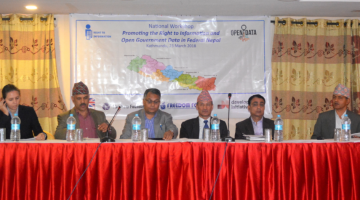At a time when the implementation of the right to information (RTI) is lagging behind despite promulgation of its laws around four years back, the freedom1 Forum is going to organize a grand national convention on right to information (RTI) first of its kind in the Capital on March 28-29, 2011.
It is grand and historic event in the access to information regime, which is scheduled to be inaugurated and graced by the Honourable President of Federal Democratic Republic of Nepal, Dr Ram Baran Yadav.
The freedom1 Forum, with the collaboration of the World Bank, is organizing the convention in a bid to enable environment for the better practices of right to information in Nepal by activating both the demand side and supply side. The convention obviously will contribute towards creating massive wave for the effective implementation of RTI by discussing the thematic areas that RTI can influence much.
In spite of the adoption of the RTI Act in 2007, Nepal has witnessed no substantial progress regarding its implementation as the role of key stakeholders is not vibrant enough to expedite ahead the RTI movement and practices as expected.
So, the convention is expected to wipe out the confusion among stakeholders as to how the RTI takes momentum to serve the greater goal of promoting state accountability, enhancing citizen’s easy access to information held by public agencies and advancing people’s empowerment.
“The convention will act as a platform which will make the stakeholders understand RTI as a tool to bring about multiplier effect in development, people’s livelihood, and social, economic and cultural perspectives”, claims freedom1 Forum Chairman Taranath Dahal.
Moreover, the convention will develop a workable national strategic plan to define the specific roles of stakeholders and to sensitize the state actors and non-state actors and thereby to bolster political will and support from stakeholders in length and breadth to enable an environment where access to information is easy and prompt.
Over a dozens of thematic papers with a trajectory of current possibilities, constraints, challenges and their implication for the RTI implementation in Nepal are to be presented followed by panel discussions on the papers where sharing of national and international practices will be given a high focus.
The national event will bring together 125 participants including representatives of Legislature, Executive and Judiciary, political parties, civil society organizations, right activists, development workers and journalists, expecting their role to create national wave to expedite the access to information campaign in Nepal. International experts from India and other countries of the South Asian region are also attending the event to facilitate an environment of sharing RTI experience in the region.

